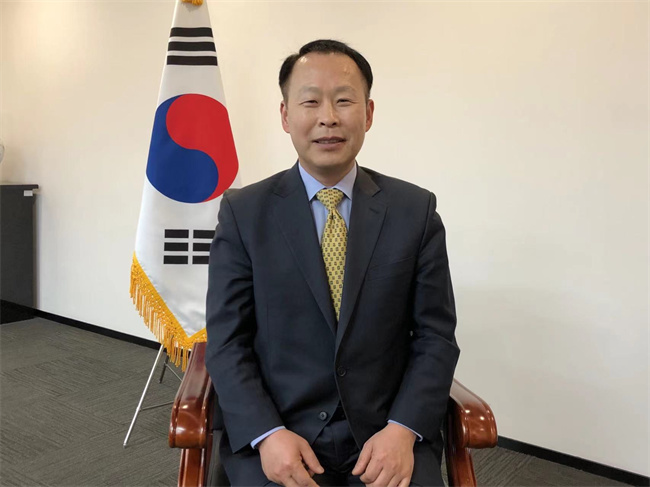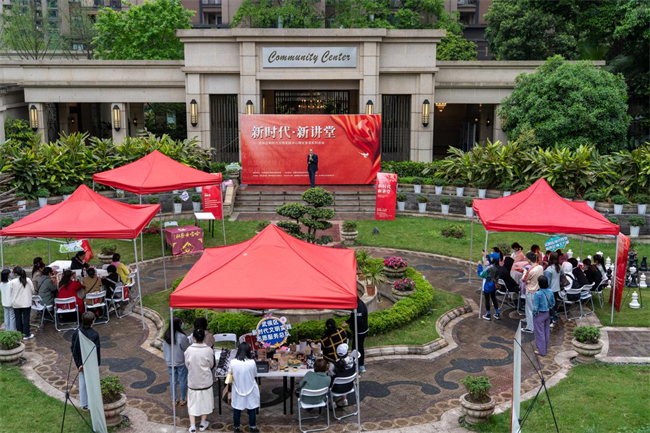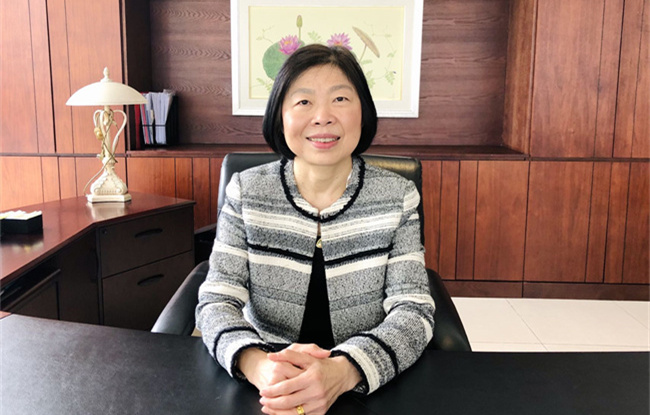RCEP Opportunities in Sichuan | Thai Consul General in Chengdu: Strengthen the Cooperation between Thai and Sichuan Businesses in E-commerce and MSMEs Development
Sc.china.com (Chen Min)Since the Regional Comprehensive Economic Partnership (RCEP) took effect on January 1, 2022, over 65% of the ASEAN exports to and from China have been subject to zero tariffs.
Under the framework of the RCEP, which is the world's largest free trade agreement (FTA), 90% of products traded in the region are expected to enjoy zero tariffs in about a decade.
Data from Chengdu Customs shows that members of the RCEP are important trading partners of Sichuan, as Sichuan's foreign trade volume with them accounts for about one-third of the province's total. Among them, ASEAN countries are the main export market of the province, while ASEAN countries, Japan and the ROK are its main import sources.
Yuan Mei, a Chinese poet of the Qing Dynasty, wrote in his poem Spring Breeze, "Like an honored guest, the spring breeze brings us prosperity when it arrives." How can Sichuan avail itself of the RCEP to promote regional economic and social development and opening-up to a higher level? Sc.china.com will roll out a series of interviews with the consuls general of RCEP member states in Chengdu on what new opportunities will the RCEP bring to Sichuan.

(Mrs. Thippawan Supamitkitja, Consul-General of Royal Thai Consulate-General in Chengdu)
Interview 3: Mrs. Thippawan Supamitkitja, Consul-General of Royal Thai Consulate-General in Chengdu
Sc.china.com: The RCEP officially came into force for Thailand on January 1, 2022. What new policies and measures will Thailand implement to advance the FTA? What are the key fields?
Mrs. Thippawan Supamitkitja: As the world's largest FTA, the RCEP will make a significant contribution to regional economic integration and boost global economic growth and prosperity. The entry into force of RCEP demonstrates its member states' firm commitment to a rule-based multilateral trading system that is open, inclusive, relevant, mutually beneficial. The Agreement provides enterprises and individuals with greater market access in trade, services, investment and employment opportunities, and facilitates the development of regional value chains. It will also help boost the competitiveness and economic recovery among the member states.
Thailand attaches great importance to RCEP. Thailand's total trade volume with other RCEP member states accounts for 57% of its global total trade. When it comes into effect, we anticipate a significant growth in our trade and investment flow with other RCEP member states, including China.
Prior to the entry into force of RCEP, Thailand has set up the RCEP Center in 2021 to help enterprises better understand the RCEP and provide information and assistance about trade and tariff policies among RCEP member states. Series of seminars were organized and rules and regulations were reviewed and revised accordingly to facilitate the implementation of the Agreement. From 1 January 2022, the documentation system related to Rules of Origin and Operational Certification Procedures has been developed to help facilitate Thai exporters.
Sc.china.com: What impacts and changes will the official operation of the RCEP bring to the people of China and Thailand?
Mrs. Thippawan Supamitkitja: The RCEP creates huge potential for Thailand's exporting and manufacturing sectors and e-commerce as well as SMEs. Local enterprises in auto parts, food processing and other manufacturing fields can strengthen the integration in the regional value and supply chains with supply of raw materials, components, semi-finished and finished goods in the RCEP market. With industrial integration, SMEs will have greater opportunities to be engaged in global and regional value chains.
Under RCEP’s trade in goods scheme, Thailand has estimated that 39,366 types of goods will benefit from tariff reduction. About 29,891 of those types have been made eligible for zero tariffs since January 1, 2022. The tariffs on the rest of the goods will gradually be reduced and finally removed in 10-20 years. Thailand will create a more open regional economic environment and further promote trade liberalization. Accordingly, Thai businesses will enjoy a significant cut in their costs and create more generous revenues.
Because of the rule of cumulation of origin, Chinese and Thai enterprises will have more flexible configurations options for production locations in the region. Therefore, the RCEP brings both direct and indirect benefits to businesses of the two countries, allowing their peoples to enjoy better products. In addition, the RCEP has enhanced data security in key areas including online consumer protection, network security, personal information protection, and cross-border information transmission, creating a stable and appropriate environment for the growth of the digital economy.
Sc.china.com: Thailand and Sichuan have maintained long-term economic cooperation. What new opportunities do you see for Sichuan enterprises to develop in Thailand now when the RCEP has taken effect?
Mrs. Thippawan Supamitkitja: It is widely believed that the RCEP brings confidence to Asia, or even the whole world, as we are facing both challenges and opportunities in economic globalization. It will take the regional partnership and Thailand-Sichuan economic and trade cooperation to a new height. The RCEP facilitates the flow of essential factors of production, the integration of industries and supply chains, the development of new industries and business segments, and the Thailand-Sichuan economic connection in an extensive way through trade and investment. It also provides greater confidence for Sichuan enterprises to establish stable industries and supply chains in Thailand and enhance their ability to cope with economic challenges and uncertainties.
Thanks to the development of e-commerce brought by the RCEP, Thailand and Sichuan can work together to promote cross-border e-commerce and micro, small, and medium-sized enterprises (MSMEs) development, including through enabling MSMEs to engage in e-commerce sector, enhancing their digital skills, innovation, and technology. We look forward to China’s support in enhancing digitization of trade along the supply chains.
Sc.china.com: What do you think of the prospects of cooperation between Thailand and Sichuan now that the RCEP has taken effect?
Mrs. Thippawan Supamitkitja: The bilateral trade volume between Thailand and Sichuan continues to rise, despite being negatively affected by the COVID-19 pandemic. In 2021, the bilateral trade volume totaled USD 1,548.59 million. Thailand's export volume to Sichuan amounted to USD 410.99 million, an increase of 22.13% YOY, and its import volume from Sichuan reached USD 1,137.6 million, an increase of 87.15% YOY. I am confident that our bilateral trade will continue to grow by utilizing the benefits of the RCEP.
As the RCEP comes into effect, Thailand and Sichuan have been given greater opportunities in the fields of food processing, agricultural products, automobiles and auto parts, machinery, plastics, petrochemicals, e-commerce, and films and cartoons, with the benefits of the elimination of tariffs, the abolition of tariff and non-tariff barriers, and the agreed rule of cumulation of origin.
To this end, the two sides can enhance their cooperation and collaboration to increase bilateral visits of their enterprises and peoples so as to further promote trade and investment, advance information sharing and cooperation, and improve SMEs' abilities to seize new opportunities. Moreover, both sides will vigorously explore possible dialogues and platforms for industries and enterprises in the area of technical cooperation and capacity building to maximize potential benefits of the RCEP.
Looking ahead, the Thai Consulate-General in Chengdu will work closely with relevant authorities in China to fully utilize and promote the effective implementation of the RCEP to ensure an open, transparent, fair, and foreseeable environment for trade and investment.
Recommend for you
Business
- Luzhou Vocational & Technical College Held the Annual Meeting of Chengdu-Chongqing Twin Cities Economic Circle Smart Retail Alliance
- How Strong Is the Cultural and Creative Atmosphere in Chengdu? Fanmate May Be One of the Answer
- The 24th Chengdu International Automobile Exhibition Will Open Soon
- Nearly 300 Design Teams Signed up for the Chengdu Community Beauty Space Global Concept Scheme Collection
- JOUAV: To Introduce Chinese-Made Drones To the world
- Leaders of Guangyuan City Made An Secret Investigation to Supervise Ecological Environmental Protection
View
- Welcome to Shimian County for A Happy New Year
- Winter of Chengdu: To Date Wintersweet in the Park City
- Colors of Sihchuan
- Sichuan Huaying Slag Field into Ecological Spotty Shot
- Go and Participate in Environmental Protection Activities in the Coming Low-carbon Day
- The 2021 APEC Women's Leadership Forum Will Be Held in Chengdu in September




